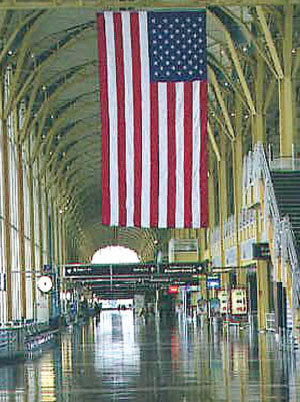
Features
Safety
Conditional Access
The US is still reluctant to roll out the welcome mat for border crossings.
October 1, 2007 By Rob Seaman
 REVISIONS TO THE RULES and regulations that govern corporate travel
REVISIONS TO THE RULES and regulations that govern corporate travel
between Canada and the US have come fast and furious since September
11th 2001. The biggest challenge is we cannot even look for a written
version of some of these revisions. One legal expert compared the
current environment to playing a game without knowing what the rules
are. Documentation of changes is often sent out to a small few, but
remain applicable to all.
Indeed,
the industry has done a backslide since pre-9/11 programs such as
CANPASS and GATE had created an easier, userfriendly atmosphere –
especially in relation to the unique travel habits of frequent flyers
who utilized private and corporate aviation. And even though the
CANPASS program has been reintroduced (in a refined format), American
authorities have said that GATE will never return.
With the
introduction of such bodies as the Department of Homeland Security and
the Transportation Security Administration (TSA) in the US and the
Canadian Air Transport Security Authority at home, many of the new
people making the decisions may be schooled in security matters but are
completely new to aviation. As Canadian Business Aviation Association
(CBAA) president Rich Gage said at a recent meeting of the Ontario
chapter, “Our group is attending a lot of meetings or involved in a
great many conference calls on the subject of aviation security and
cross-border issues. Having been in this business for a long time, I
have to admit that many of the faces at the table are new to me. So the
tough job for us becomes one of education – helping them to understand
what private and corporate aviation is all about and how it works.
Without this sort of information, the rules that are being developed
and implemented have a tendency to be a little off the mark or hard to
administer through the FBO and flight department network.”
Private
aviation continues to operate under increased scrutiny and, in some
quarters, condemnation, with some US politicians keen to shut out
general aviation over certain municipalities. Eyebrows were raised, for
example, when a ‘Dear Colleague’ letter was distributed to members of
Congress urging them to sign a petition asking Homeland Security to
immediately impose a 15-mile-restricted area over New York City,
similar to what already exists over Washington. Such a curtain would
cover some major New York area airports, including Teterboro, which
would only be accessible to aircraft already based at this gateway
airport.
At one point, officials were considering a 40-mile
no-fly zone. That idea was scuttled when they realized that all the
nofly zones were starting to intersect with each other and affecting
vast areas of airspace.
The recent move by the mayor of Chicago
to close Meigs Field is but another example of how aviation is being
severely beaten up and has few friends to defend it. While he may have
won the short-term battle by having the runways bulldozed in the dead
of night, stranding a dozen plus aircraft on the field, he has most
certainly brought the wrath of such organizations as the Aircraft
Owners and Pilots Association and the National Business Aviation
Association (NBAA) down upon him. But with the legal actions piling up,
it will take years to resolve the issue and for the present, the mayor
has won his point – that Meigs Field could be used to launch a
terrorist attack against his city and should be closed. There are some
who would encourage a similar approach to Toronto City Centre Airport –
solving the land-link dispute once and for all.
Aircraft
routinely operate through FBOs across North America without incident,
although on both sides of the border, officials are putting greater
emphasis on personal backgrounds. A more efficient exchange of
information between Canadian and US authorities has also increased the
pace that personal details are being shared. For those with a past
lapse in judgment, indiscretion or youthful experience they would
rather forget, this can and may come back to haunt them in the new
zerotolerance world.